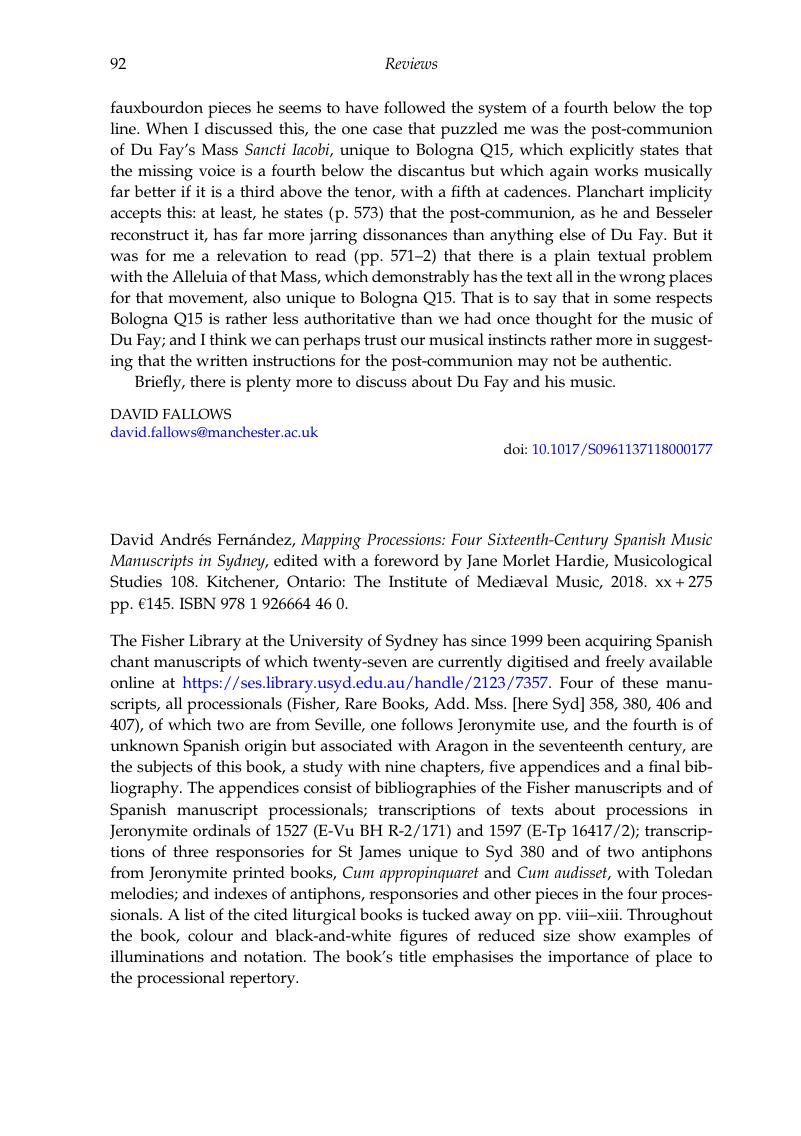No CrossRef data available.
Published online by Cambridge University Press: 09 April 2019

1 The processionals of Cambrai Cathedral were kept in the vestry, not in the choir stalls; there is no evidence of personal possession. See Haggh-Huglo, Barbara, ‘The Late-Medieval Liturgical Books of Cambrai Cathedral: A Brief Survey of the Evidence’, in Laborare fratres in unum: Festschrift László Dobszay zum 60. Geburtstag, ed. Szendrei, Janka and Hiley, David (Hildesheim, 1995), 79–85Google Scholar.
2 See Kellman, Herbert, ed., The Treasury of Petrus Alamire (Ghent, 1999), 10Google Scholar, for discussion and 94, 111 and 120 for examples.
3 See Enríquez, Lucero, Davies, Drew Edward and Cherñavsky, Analía, Catálogo de obras de música del Archivo del Cabildo Catedral Metropolitano de México (Mexico City, 2014)Google Scholar.
4 The use of the liturgy for the Nativity of Mary for the Conception was prescribed in the Helsin miracle known by 1140. Helsin, the abbot from Ramsey, was saved from drowning by an angel who required him to introduce the feast of the Conception using the Nativity liturgy but replacing that word with ‘Conception’. The Helsin miracle was later told in the Golden Legend.
5 Seventeenth- and eighteenth-century manuscripts of the Jeronymites are also kept in the Free Library of Philadelphia.
6 On other Hieronymites, see Jaspert, Nikolas, Religion, Past and Present (Leiden, 2011)Google Scholar and Daris, Joseph, Le Collège des frères Hiéronymites à Liège (Liège, 1872)Google Scholar.
7 Meeting of the IMS Study Group ‘Cantus Planus' in Växjö, Sweden, in Summer 2018.
8 Haggh, Barbara, ‘From Auxerre to Soissons: The Earliest History of the Responsory Gaude, Maria Virgo in Gautier de Coincy's Miracles de Nostre Dame’, in Gautier de Coinci: Miracles, Music, and Manuscripts, ed. Krause, Kathy M. and Stones, Alison (Turnhout, 2007), pp. 167–93Google Scholar.
9 Haggh, Barbara, ‘Guillaume Du Fay and the Evolution of the Liturgy of Cambrai Cathedral in the Fifteenth Century’, in International Musicological Society Study Group Cantus Planus: Papers Read at the Fourth Meeting, Pécs, Hungary, 3–8 September 1990, ed. Dobszay, L. and others (Budapest, 1992), 549–69Google Scholar, at p. 561.